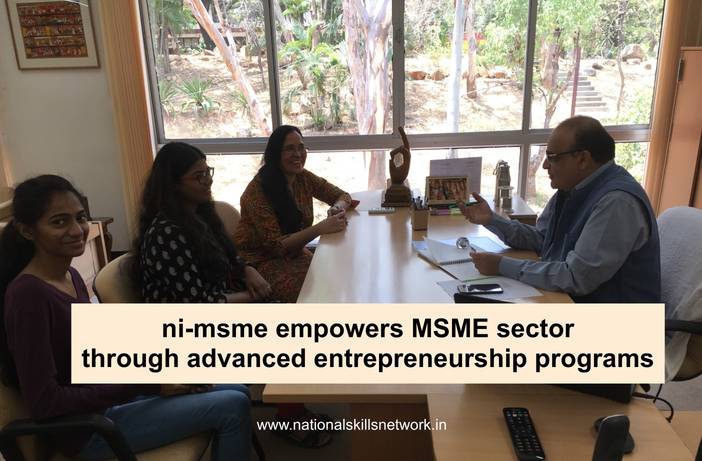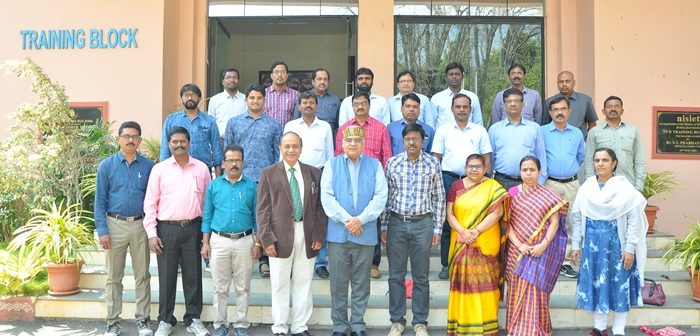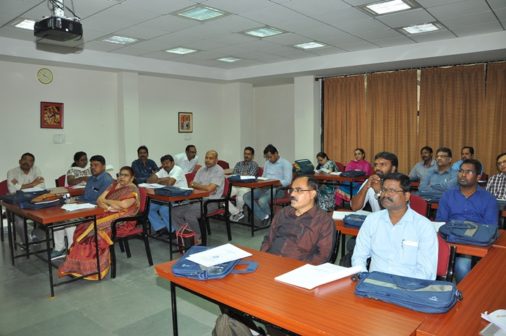MSME sector in India ranks the second largest after China and accounts for more than 40% of the total exports of the nation and contributes 9% to the GDP. However, creation of skilled entrepreneurs in the informal sector is a big challenge that needs to be addressed systematically. To boost the entrepreneurship in this sector, Government of India (GoI) implements various training and skill development programs. National Institute for Micro, Small and Medium Enterprises (ni-msme), Hyderabad, under the aegis, of Ministry of MSME, GoI, is India’s first institution to start the wave of entrepreneurship development through skilling, mentoring and incubation support. We spoke with Dr. Sanjeev Chaturvedi, Director, ni-msme to know more about the initiatives, plans and impact. Here we go with the excerpts from the interview:
 Q: How has ni-msme evolved into a Centre of Excellence with its innovative initiatives?
Q: How has ni-msme evolved into a Centre of Excellence with its innovative initiatives?
A: ni-msme was originally set up as Central Industrial Extension Training Institute (CIETI) in New Delhi in 1960 as a Department under the Ministry of Industry and Commerce, Government of India. The idea was to promote small enterprises with less administrative controls and procedures. In 1962, the institute was shifted to Hyderabad and was renamed as Small Industry Extension Training (SIET) Institute. SIET was managed by Governing Council, appointed by the Government of India. Later, SIET was conferred the status of national institute by the Government of India.
In 1984, the UNIDO recognised SIET for its meritorious performance under its Centres of Excellence Scheme. It was also accorded the national status in the same year and SIET Institute became NISIET. Since then, the institute has come a long way, carving a place of distinction for itself in the domain of entrepreneurship promotion, achieving recognition both at the national and international level.
As you know, to cope with the pressure of globalisation, the Government of India has enacted the MSMED Bill in the Parliament, which became effective from 2nd October 2006. Accordingly, the Institute, in order to reflect the expanded focus of its objectives was rechristened as ni-msme from 11th April 2007. Today, it is an organisation of the Ministry of Micro, Small and Medium Enterprises (formerly Ministry of SSI & ARI), Government of India.
According to a survey report titled ‘Survey on Jobs Creation and Outlook in MSME Sector’ by the Confederation of Indian Industry (CII) recently ,Micro, Small and Medium enterprises (MSMEs) is the largest job creator for the last four years with growth of 13.9 per cent.
 Q: What are the core focus areas for ni-msme?
Q: What are the core focus areas for ni-msme?
A: ni-msme is the first institution in India to prove that entrepreneurs can be created with the right kind of mentoring and skills training. With our unique initiatives, we have been promoting many individuals and families who are otherwise confined to small family businesses. ni-msme primarily focuses on three areas: national calendar, where we plan various Entrepreneurship Development Programmes (EDP); international admissions which provide opportunity for aspiring students and clusters which operate in different parts of the country.
Our main objective is to initiate entrepreneurship development, provide consultancy, research, extension and information services. Over the years, we have gained immense experience and expertise in these areas. Our capacity to innovate with top-class infrastructure has enabled us to excel in micro and small enterprise promotion. We also organize programmes, workshops and seminars on contemporary themes for MSMEs and executives.
Q: Can you tell us more about the management of MSME Clusters?
A: MSME sector contributes to Rs.3.6 crore jobs in the manufacturing sector. In today’s competitive environment, an extremely vibrant MSME sector is essential for the development of our economy. Government strives to implement many strategies and schemes for the development of the sector and Cluster approach is one of the successful strategies.
There are about MSME 7500 clusters in India. Government has been implementing 26 cluster development schemes for the benefit of MSME sector. In addition, many International agencies, Commercial banks and NGOs are also taking part in cluster development. Some of the schemes being implemented by the government include Micro and Small Enterprises Cluster Development Programme (MSE-CDP), Scheme of Fund for Regeneration of Traditional Industries (SFURTI), Comprehensive Handlooms Cluster Development Scheme (CHCDS), Baba Saheb Ambedkar Hastshilp Vikas Yojana (BAHVY) etc.
Clusters help people to unleash their potential in a productive manner. For example, in one of our clusters in Mothkur, Telangana, we encourage people to expand their family business in traditional crafts such as handlooms. We have a common facility centre to mentor and guide people through the right way. They get access to new tools and market where they can develop their business.

Entrepreneurs who wish to start or expand their business should be willing to solve a problem of the masses. Today, we know how social entrepreneurs and NGOs are transforming the society through their unique initiatives. Identifying and solving a problem through a strong and unique business plan is essential to the success of a business. The plan should be strong enough to address a challenge.
Q: How are you creating awareness among entrepreneurs?
A: As I have mentioned, MSME sector faces a lot of challenges like unavailability of funds, increase in competition, access to opportunities, market linkages, inexperience, ignorance of schemes etc. Availability of finance is a major issue. Bankers often deny money to entrepreneurs due to poor business proposals. Since, many people are unaware about the market and legal formalities, we help them to make proposals and go through the procedures free of cost. We link them to prospective lenders and guide them properly.
We have started two centres for GST filing and Intellectual Property facilitation to create awareness among the enterpreneurs. We also organize various skill development programmes to educate people about the MSME ecosystem.
Q: What are the future plans of ni-msme for the development of MSME sector?
 A: We conduct various workshops and entrepreneurship skill training programmes. Going ahead, our focus will be on research and consultancy. We get a lot of queries from start-ups regarding the market situation. Many of them are not aware about the industry. They also lack expertise in legal and business procedures. We want to bridge this gap through proper mentoring. Our research can aid better in offering customized solutions based on the market trends.
A: We conduct various workshops and entrepreneurship skill training programmes. Going ahead, our focus will be on research and consultancy. We get a lot of queries from start-ups regarding the market situation. Many of them are not aware about the industry. They also lack expertise in legal and business procedures. We want to bridge this gap through proper mentoring. Our research can aid better in offering customized solutions based on the market trends.
We are also encouraging enterprises to register on GeM (Government e-Marketplace) where they will get more visibility and business opportunity. Another plan that we have proposed to the ministry is the impact study of the government schemes. A proper study of the government schemes will be effective in analysing the successes and failures. This helps us to strategise our plans more efficiently. We also aim at handholding with companies for minimum 3 years to help them sustain their business.












